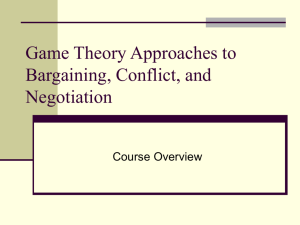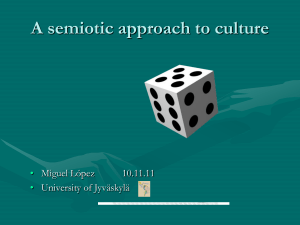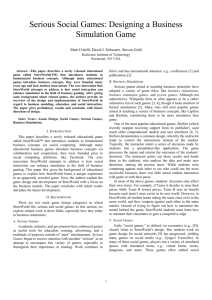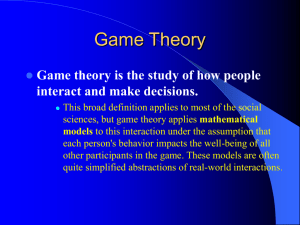MBA 217-1 Game Theory Approaches to Bargaining, Conflict, and
advertisement
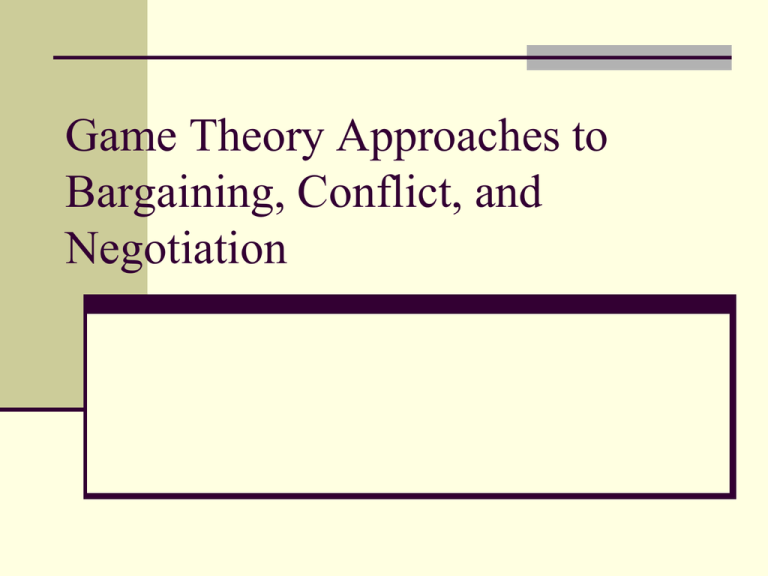
Game Theory Approaches to Bargaining, Conflict, and Negotiation Price Dispersion Visit any Internet price comparison site and you’ll notice a large range in prices for an identical item Why the range in prices? Branding Awareness Stock on hand Strategy The Strategy of Unpredictability Firms sell to price conscious shoppers as well as “loyal” consumers Cutting price to attract shoppers eats into profits from loyals At the same time, offering a low price has a big payoff from the shoppers (elasticity = 51). It pays for a firm to be unpredictable in its pricing … the old story about two friends… Two suspects, Henry and Dave are taken into custody and separated. The policeman accuses them of a crime but lacks sufficient evidence to convict them, unless at least one of them confesses. He explains the consequences following the two actions they could take: namely confessing the crime or not confessing it. The policeman says: ”If neither of you confess, then both will be convicted of a minor offence and sentenced to 2 years in jail. If you both confess, then I will sentence you to jail for 3 years. If one of you confesses then he will be treated leniently and will be on remand for 1 year; and used as a witness against the other, who will be sentenced to 5 years in jail; 4 for the crime and 1 for obstructing the justice.” http://www.negotiation.hut.fi/theory/PrisonersDilemma.html In a picture … Prisoner’s Dilemma in business Even though both companies expended huge amounts of money to gain a competitive advantage, their relative competitive position ends up unchanged. Both companies are worse off than if they had each slackened the pace of innovation This is an example of a prisoner’s dilemma The Uses of Game Theory Explanatory A lens through which to view and learn from past negotiations/conflicts Predictive With many caveats Prescriptive The main thing is the theory helps you to think strategically Terminology Strategies Choices available to each of the players Might be conditioned on history Payoffs Some numerical representation of the objectives of each player Could take account fairness/reputation, etc. Does not mean players are narrowly selfish Tactics Nibbling The Hot Potato The Higher Authority Good Guy, Bad Guy http://www.youtube.com/watch?v=SNHU2E9gKos Feel Felt Found http://www.youtube.com/watch?v=ufISOMmGGEA Dumb is smart, smart is dumb http://www.youtube.com/watch?v=3oKwg6W05MU http://www.youtube.com/watch?v=NPRlHwwVIug&feature=related Negotiation Practice Scenario A: You have a business plan. You want B to invest in the plan. You need €50 000. Decide what you can/are willing to give in return. B: You are a business angel. Decide on the conditions you would expect when investing in a project (right to decide, ROI, legal implications etc) Standard Assumptions Rationality Players are perfect calculators and implementers of their desired strategy Common knowledge of rules All players know the game being played Equilibrium Players play strategies that are mutual best responses http://www.youtube.com/watch?v=kK-aQisdJ30
